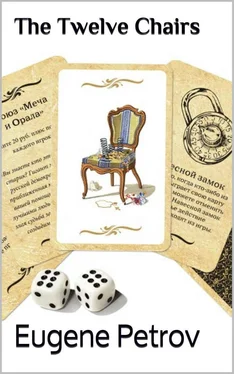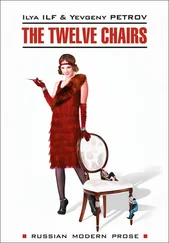Eugene Petrov - The Twelve Chairs
Здесь есть возможность читать онлайн «Eugene Petrov - The Twelve Chairs» весь текст электронной книги совершенно бесплатно (целиком полную версию без сокращений). В некоторых случаях можно слушать аудио, скачать через торрент в формате fb2 и присутствует краткое содержание. Год выпуска: 2013, Жанр: Юмористическая проза, на английском языке. Описание произведения, (предисловие) а так же отзывы посетителей доступны на портале библиотеки ЛибКат.
- Название:The Twelve Chairs
- Автор:
- Жанр:
- Год:2013
- ISBN:нет данных
- Рейтинг книги:5 / 5. Голосов: 1
-
Избранное:Добавить в избранное
- Отзывы:
-
Ваша оценка:
- 100
- 1
- 2
- 3
- 4
- 5
The Twelve Chairs: краткое содержание, описание и аннотация
Предлагаем к чтению аннотацию, описание, краткое содержание или предисловие (зависит от того, что написал сам автор книги «The Twelve Chairs»). Если вы не нашли необходимую информацию о книге — напишите в комментариях, мы постараемся отыскать её.
Find traces of a separate headset difficult and heroes face different adventures and troubles.
The Twelve Chairs — читать онлайн бесплатно полную книгу (весь текст) целиком
Ниже представлен текст книги, разбитый по страницам. Система сохранения места последней прочитанной страницы, позволяет с удобством читать онлайн бесплатно книгу «The Twelve Chairs», без необходимости каждый раз заново искать на чём Вы остановились. Поставьте закладку, и сможете в любой момент перейти на страницу, на которой закончили чтение.
Интервал:
Закладка:
Vorobyaninov, that chair reminds me of our life. We're also floating with
the tide. People push us under and we come up again, although they aren't
too pleased about it. No one likes us, except for the criminal investigation
department, which doesn't like us, either. Nobody has any time for us. If
the chess enthusiasts had managed to drown us yesterday, the only thing left
of us would have been the coroner's report. 'Both bodies lay with their feet
to the south-east and their heads to the north-west. There were jagged
wounds in the bodies, apparently inflicted by a blunt instrument.' The
enthusiasts would have beaten us with chessboards, I imagine. That's
certainly a blunt instrument. The first body belonged to a man of about
fifty-five, dressed in a torn silk jacket, old trousers, and old boots. In
the jacket pocket was an identification card bearing the name Konrad
Karlovich Michelson . ..' That's what they would have written about you,
Pussy."
"And what would they have written about you?" asked Ippolit Matveyevich
irritably.
"Ah! They would have written something quite different about me. It
would have gone like this: 'The second corpse belonged to a man of about
twenty-seven years of age. He loved and suffered. He loved money and
suffered from a lack of it. His head with its high forehead fringed with
raven-black curls was turned towards the sun. His elegant feet, size
forty-two boots, were pointing towards the northern lights. The body was
dressed in immaculate white clothes, and on the breast was a gold harp
encrusted with mother-of-pearl, bearing the words of the song "Farewell, New
Village!" The deceased youth engaged in poker-work, which was clear from the
permit No. 86/1562, issued on 8/23/24 by the Pegasus-and-Parnasus
craftsmen's artel, found in the pocket of his tails.' And they would have
buried me, Pussy, with pomp and circumstance, speeches, a band, and my
grave-stone would have had the inscription 'Here lies the unknown
central-heating engineer and conqueror, Ostap-Suleiman-Bertha-Maria Bender
Bey, whose father, a Turkish citizen, died without leaving his son,
Ostap-Suleiman, a cent. The deceased's mother was a countess of independent
means."
Conversing along these lines, the concessionaires nosed their way to
the bank.
That evening, having increased their capital by five roubles from the
sale of the Vasyuki boat, the friends went aboard the diesel ship Uritsky
and sailed for Stalingrad, hoping to overtake the slow-moving lottery ship
and meet the Columbus Theatre troupe in Stalingrad.
The Scriabin reached Stalingrad at the beginning of July. The friends
met it, hiding behind crates on the quayside. Before the ship was unloaded,
a lottery was held aboard and some big prizes were won.
They had to wait four hours for the chairs. First to come ashore was
the theatre group and then the lottery employees. Persidsky's shining face
stood out among them. As they lay in wait, the concessionaires could hear
him shouting:
"Yes, I'll come to Moscow immediately. I've already sent a telegram.
And do you know which one? 'Celebrating with you.' Let them guess who it's
from."
Then Persidsky got into a hired car, having first inspected it
thoroughly, and drove off, accompanied for some reason by shouts of
"Hooray!"
As soon as the hydraulic press had been unloaded, the scenic effects
were brought ashore. Darkness had already fallen by the time they unloaded
the chairs. The troupe piled into five two-horse carts and, gaily shouting,
went straight to the station.
"I don't think they're going to play in Stalingrad," said Ippolit
Matveyevich.
Ostap was in a quandary.
"We'll have to travel with them," he decided. "But where's the money?
Let's go to the station, anyway, and see what happens."
At the station it turned out that the theatre was going to Pyatigorsk
via Tikhoretsk. The concessionaires only had enough money for one ticket.
"Do you know how to travel without a ticket?" Ostap asked Vorobyaninov.
"I'll try," said Vorobyaninov timidly.
"Damn you! Better not try. I'll forgive you once more. Let it be. I'll
do the bilking."
Ippolit Matveyevich was bought a ticket in an upholstered coach and
with it travelled to the station Mineral Waters on the North Caucasus
Railway. Keeping out of sight of the troupe alighting at the station
(decorated with oleander shrubs in green tubs), the former marshal went to
look for Ostap.
Long after the theatre had left for Pyatigorsk in new little local-line
coaches, Ostap was still not to be seen. He finally arrived in the evening
and found Vorobyaninov completely distraught.
"Where were you?" whimpered the marshal. "I was in such a state?"
"You were in a state, and you had a ticket in your pocket! And I
wasn't, I suppose! Who was kicked off the buffers of the last coach of your
train? Who spent three hours waiting like an idiot for a goods train with
empty mineral-water bottles? You're a swine, citizen marshal! Where's the
theatre? "
"In Pyatigorsk."
"Let's go. I managed to pick up something on the way. The net income is
three roubles. It isn't much, of course, but enough for the first purchase
of mineral water and railway tickets."
Creaking like a cart, the train left for Pyatigorsk and, fifty minutes
later, passing Zmeika and Beshtau, brought the concessionaires to the foot
of Mashuk.
CHAPTER THIRTY-SIX
A VIEW OF THE MALACHITE PUDDLE
It was Sunday evening. Everything was clean and washed. Even Mashuk,
overgrown with shrubbery and small clumps of trees, was carefully combed and
exuded a smell of toilet water.
White trousers of the most varied types flashed up and down the toy
platform: there were trousers made of twill, moleskin, calamanco, duck and
soft flannel. People were walking about in sandals and Apache shirts. In
their heavy, dirty boots, heavy dusty trousers, heated waistcoats and
scorching jackets, the concessionaires felt very out of place. Among the
great variety of gaily coloured cottons in which the girls of the resort
were parading themselves, the brightest and most elegant was the uniform of
the stationmaster.
To the surprise of all newcomers, the stationmaster was a woman. Auburn
curls peeped from under her red peaked cap with its two lines of silver
braid around the band. She wore a white tunic and a white skirt.
As soon as the travellers had had a good look at the station-master,
had read the freshly pasted notices advertising the tour of the Columbus
Theatre and drunk two five-kopek glasses of mineral water, they went into
the town on the Station-Flower Garden tram route. They were charged ten
kopeks to go into the Flower Garden.
In the Flower Garden there was a great deal of music, a large number of
happy people, and very few flowers. A symphony orchestra in a white
shell-like construction was playing the "Dance of the Gnats"; narzan mineral
water was on sale in the Lermontov gallery, and was also obtainable from
kiosks and vendors walking around.
No one had time for the two grimy jewel-hunters.
"My, Pussy," said Ostap, "we're out of place in all this festivity."
The concessionaires spent their first night at the spa by a narzan
spring.
It was only there, in Pyatigorsk, when the Columbus Theatre had
performed their version of The Marriage to an audience of astounded
town-dwellers for the third time, that the partners realized the real
Читать дальшеИнтервал:
Закладка:
Похожие книги на «The Twelve Chairs»
Представляем Вашему вниманию похожие книги на «The Twelve Chairs» списком для выбора. Мы отобрали схожую по названию и смыслу литературу в надежде предоставить читателям больше вариантов отыскать новые, интересные, ещё непрочитанные произведения.
Обсуждение, отзывы о книге «The Twelve Chairs» и просто собственные мнения читателей. Оставьте ваши комментарии, напишите, что Вы думаете о произведении, его смысле или главных героях. Укажите что конкретно понравилось, а что нет, и почему Вы так считаете.












